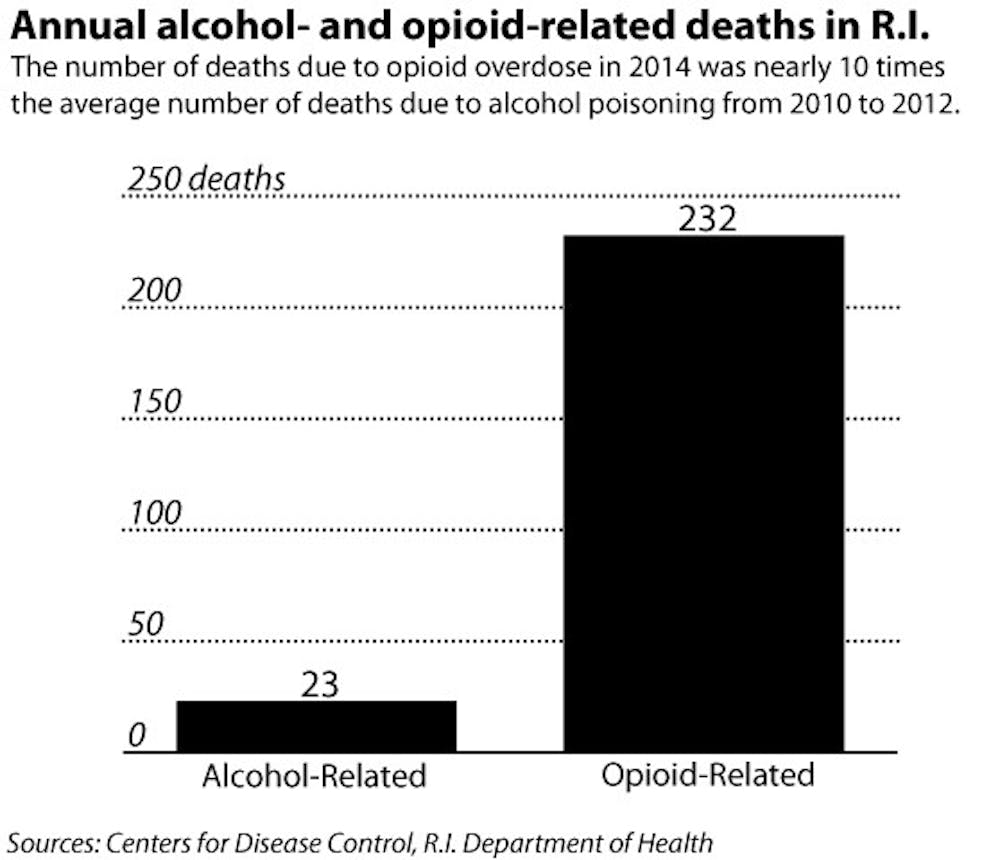Rhode Island has recently found itself at the top of some undesirable lists — the state came in third in alcohol poisoning deaths and first in illicit drug use, according to findings from the Centers for Disease Control. Topping both lists has challenged the Ocean State to confront the conditions that led to its poor rankings and work toward possible solutions.
A possible reason for Rhode Island’s widespread substance abuse is the state’s high unemployment rate, which has persisted in recent years despite positive national economic trends. Rhode Island claimed the fourth highest rate — 7.1 percent — in the country. The loss of jobs has a positive correlation with alcohol abuse and substance dependence, according to a study from the National Institute of Health.
The CDC data showed that the majority of deaths from alcohol poisoning affected non-Hispanic white men between ages 35 and 64, and 70 percent of the deaths occurred among binge drinkers who were not alcohol-dependent, said David Lewis, founder of the University’s Center for Alcohol and Addiction Studies. Binge drinking is defined as the consumption of more than five drinks for men and more than four drinks for women in one sitting.
But 30 percent of the deaths were among alcoholics in the same age range, reflecting the five to 10 year gestation period for alcoholism, said Reinhard Straub, CEO and clinical director of Clinical Services of Rhode Island.
“Thirty-five to 64 is where you see people literally drinking themselves to death,” Straub said. “It’s when their disease has progressed to a fatal illness.”
As policymakers move forward, they look to address substance dependency as a legal issue and as a medical condition.
“We’re spending way too much on jail, and can’t afford treatment,” Straub said, noting that people who receive treatment are far more likely to recover than those who are incarcerated. But only 10 percent of those affected ever receive the proper treatment, Lewis said, adding that this discrepancy could reveal an avenue for addressing the problem.
“Addiction is not a crime. It’s a mental illness,” said Diego Arene-Morley ’16, president of Students for Sensible Drug Policy. “It would be one thing if making drugs illegal actually stopped people from using them, but it doesn’t,” he said, likening the current popularity of marijuana and other drugs to the abundant use of alcohol during Prohibition.
Portugal, a country that has fully decriminalized drugs, has seen a sharp decrease in overdoses and HIV contraction, Arene-Morley said.
Though decriminalization and legalization of illicit drugs may increase the number of individuals who receive treatment, there is still is no consensus on whether marijuana should be legal in Rhode Island.
Many of the heroin addicts who seek treatment at Clinical Services of Rhode Island say marijuana was their gateway to becoming a drug addict, Straub said.
But when the government regulates a mainstream substance such as marijuana, the illicit market for the drug is diminished, and it prevents the younger population from having unrestricted access to it, Arene-Morley said.
“If you’re a 15-year-old kid, your dealer isn’t going to card you,” he said. “Especially when he goes from selling you weed to offering you harder drugs.”
Though the legalization of marijuana is still a fairly new experiment, but the drug’s use did not spike in Colorado or parts of Europe post-legalization, Lewis said.
Arlene-Morley said he believes marijuana’s status as a Schedule I controlled substance exaggerates the risk involved in using it — marijuana is not lethal, whereas alcohol, cigarettes and prescription painkillers are responsible for hundreds of thousands of deaths nationwide every year.
The problem also disproportionately affects low-income minority groups.
“Rates of drug use in Rhode Island are the same for whites and blacks, but mostly blacks are getting arrested,” Arene-Morley said. “If whites got arrested as much, drug laws would look very different.”





